Yesterday’s live coverage of the Ukraine conflict can be found here. An archive of our liveblogs can be found here. For an overview and analysis of this developing story see our latest podcast.
Please help The Interpreter to continue providing this valuable information service by making a donation towards our costs.
For links to individual updates click on the timestamps.
For the latest summary of evidence surrounding the shooting down of flight MH17 see our separate article: Evidence Review: Who Shot Down MH17?
RFE/RL reports:
At least one person has been reported killed after an artillery shell hit a hospital in the separatist-controlled city of Donetsk in eastern Ukraine.
A spokeswoman for the pro-Russian separatists in Donetsk, Yuliana Bedilo, said the shell “hit hospital No. 20, setting it on fire” during the evening of February 11.
The press service for the local emergency services said at least eight people were injured, most suffered from burns after part of the building caught fire.
The news outlet Novosti.dn.ua has posted this video which reportedly shows the shelling, though we cannot verify the video because it was taken at night.
Earlier we reported that a bus station in central Donetsk was hit by shelling, killing at least one civilian.
The OSCE has yet to release today’s spot report from the Special Monitoring Mission.
— James Miller
This picture was posted by The Insider:

In some of the pictures the body language is likely accidental or out of context. In others the message is clear. Regardless, the fact that Putin and Poroshenko don’t like each other is as obvious as the fact that their two nations are engaged in a war. What’s important is whether any new deal is struck, and how it is to be implemented.
The meeting in Minsk has now moved on to the next stage, and all the talks are private. There are contradictory reports about whether any official statement will be released today, so we’ll keep an eye out for any verified news to come out of Minsk.
— James Miller
It’s unclear if there will be a statement after the next meeting.
— James Miller
Aleksandr Zakharchenko, prime minister of the self-proclaimed “Donetsk People’s Republic,” and Igor Plotnitsky, head of the “Lugansk People’s Republic” have presented their demands to the Minsk talks.
The document has been leaked and published by 24todaynet as well as Zerkalo Nedeli and UNIAN which have published partial translations of the document into English.
The key aspects of the document involve yet another ceasefire and pulling heavy artillery back even further than under the Minsk agreement to at least 50 kilometers.
Interestingly, the Russian-backed separatist leaders reference the “annex” to the Minsk agreement which has not been acknowledged and about which there is some controversy, as ZN.ua reported (see our summary translation here, “‘Topography of Blood’ – Secret Annex to the Minsk Peace Agreements Shows Donetsk Airport Outside the Line of Contact”).
A crucial issue is just which “certain districts of Donetsk and Lugansk Regions” are to be granted special autonomous status, effectively handing them to the separatists. No accepted, authorized list of these districts has ever been agreed to and published.
Will it include every town now being battled for fiercely by Russian-backed troops, sometimes even under Russian direction as in Debaltsevo, a key hub which militants claim they have now surrounded on all sides?
Will it include Kramatorsk, which the Russian-backed militants attacked yesterday with rockets, killing at least 7 civilians — with weapon systems they may have obtained from Russia?
Will it contain every little town along the “line of contact” where there have been clashes and incidents if not outright battles, some of which are now re-taken by Ukrainian forces, such as Slavyansk, and some lost, such as the Donetsk Airport — which the Ukrainian government maintains was never on the annex list as such.
The Russian-backed separatists also want to have Ukraine essentially admit defeat by February 23, 2015 — a significant date not only because it is two weeks from now, but because it is the traditional Red Army Day of the Soviet Union, which since the collapse of the USSR has been celebrated in Russia as Fatherland Defenders Day.
This day was not celebrated in Ukraine after the end of the Soviet Union, but then it was restored under the presidency of Leonid Kuchma — the Ukrainian interlocutor in the Minsk peace talks. President Petro Poroshenko abolished it, however, saying Ukraine should not celebrate “the military-historical calendar of Russia” but should honor the “defenders of our homeland, not someone else’s.”
Another obvious problem with this proposal is the haste with which a new municipal election law is demanded in the “people’s republics.” The date for elections themselves is not mentioned. Zakharchenko already held unrecognized elections in the DNR and LNR, which is why Poroshenko threatened to abolish the “Law on Special Status for the Donbass” — but which he in fact did not abolish, and reiterated during the Munich Security Conference — the law is still in effect.
Again, the crucial question is not only how it applies, but where — and whether the Ukrainian ATO will be persuaded to withdraw from certain areas they believe they have already re-conquered, and visa-versa, whether Russian-backed forces will demand to keep the territories they have already grabbed.
The Interpreter has translated the document in full:
Protocol of Meeting of Trilateral Contact Group with Participation of Representatives of Certain Districts of the Donetsk and Lugansk Regions Regarding Complex of Measures for Political Settlement of the conflict
In fulfillment of the Protocol on Results of Consultations (Minsk, Republic of Belarus, September 5, 2014, participants in the Trilateral Contact Group with representatives of Ukraine, Russia and OSCE and representatives of certain regions of Donetsk and Lugansk Regions
1. Guarantee comprehensive ceasefire from 10:00 (Kiev time) on February 12, 2015
2. Guarantee removal of heavy armaments (caliber of 100 mm and higher)
– for Ukrainian troops – from the actual line of contact of the sides
– for armed formations of certain districts of Donetsk and Lugansk Regions – from the line of contact of the sides according to the Minsk Memorandum of September 19, 2014
For creation of a zone of safety armament systems must be withdraw from each other at a distance:
– for heavy armaments – no less than 50 km;
– multiple launch rocket systems (except for Smerch and Uragan MLRS) – no less than 70 km
Tochka, Tochka-U rocket systems and Smerch and Uragan MLRS are to be withdrawn to a distance of no less than 140 km from the actual line of contact (only for the Ukrainian Armed Forces).
The withdrawal must start no later than the second day after the ceasefire.
Military experts from the OSCE with the support of the Trilateral Contact Group must facilitate the process.
3. Pass by February 20, 2015 a Resolution of the Verkhovna Rada of Ukraine with an indication of a list of districts to which the special status applies in compliance with the Law of Ukraine “On Temporary Procedure for Local Self-Governance in Certain Districts of the Donetsk and Lugansk Regions” (“On the Special Status”) (within the limits of the line of contact established by the Annex to the Minsk Memorandum of September 19, 2014).
4. By March 20, 2015, work out with representatives of the certain districts a draft Law on Ukraine on municipal elections in certain districts and begin a dialogue on issues of providing these districts the status of autonomy.
5. Guarantee effective monitoring and verification of the ceasefire and the withdrawal of heavy armaments by the OSCE from the first day, with the application of all necessary technical means, including satellite, unmanned aerial vehicles [drones], radar location systems.
6. Abolish by February 23, 2015 all decisions of the political and military leadership of Ukraine on the conducting of the Armed Forces and National Guard of the Anti-Terrorist Operation in the Donbass.
7. Pass and put into effect by February 25, 2015 a Law of Ukraine forbidding the persecution and punishment of persons related to the events that took place in certain districts of the Donetsk and Lugansk Regions which were under control or are under control of the armed formations of the Donbass.
8. Guarantee pardon, amnesty and exchange of all persons detained on the territory of Ukraine (all for all). This process should be completed no later than the fifth day after the withdrawal.
9. Restore the social services of certain districts of Donetsk and Lugansk Regions (payment of pensions and supports) and guarantee the safety of the access, delivery, storage and distribution of humanitarian aid for the needy on the basis of international mechanisms.
10. Restore in full the social-economic interactions of the side, including in the area of banking.
11. Remove all foreign military formations, military vehicles, and also military personnel and mercenaries from the territory of Ukraine, under OSCE monitoring. Disarm all unlawful groups.
12. Conduct constitutional reform in Ukraine, including deep decentralization by means of provision of the status of autonomy to certain districts of the Donbass.
13. Organize free and honest elections of all local government bodies on the basis of a Law of Ukraine on Municipal Elections in Certain Districts and Law of Ukraine on the Special Status of Donbass with international monitoring, on the basis of agreement with representatives of certain districts of Donetsk and Lugansk Regions.
14. At a certain stage of political settlement (after the entering into force of amendments to the Constitution of Ukraine on decentralizaiton and provision of the status of autonomy of certain districts and the signing of the Act on Guarantees of Safety of Elected Persons and Institutes of Self-Governance of Donbass), in agreement with representatives of certain districts of the Donetsk and Lugansk Regions to ensure extension of the work of the mission of the OSCE on portions of the border not under control of Ukraine at the present time.
15. Intensification of the work of the Trilateral Contact Group with the participation of representatives of certain districts of the Donetsk and Lugansk Regions on a permanent basis. For working sub-groups on all aspects of implementation of the present Protocol.
— Catherine A. Fitzpatrick
Andiy Tsaplienko, a reporter for Ukraine’s TSN, writes on his Facebook page that Ukrainian forces have mounted a successful operation on the southern front, east of Volnovakha.
The Interpreter translates:
Can talk about this today. A unit from the seventy-second brigade carried out a powerful raid near the villages of Novolapsa and Belaya Kamenka on February the tenth. A checkpoint and a store of ammunition was destroyed in Novolapsa. The enemy lost two tanks, two infantry fighting vehicles and one self-propelled gun. Our side suffered no losses. Troops are now preparing new positions around Volnovakha. They say that, just in case, it’ll be easier to advance from there.

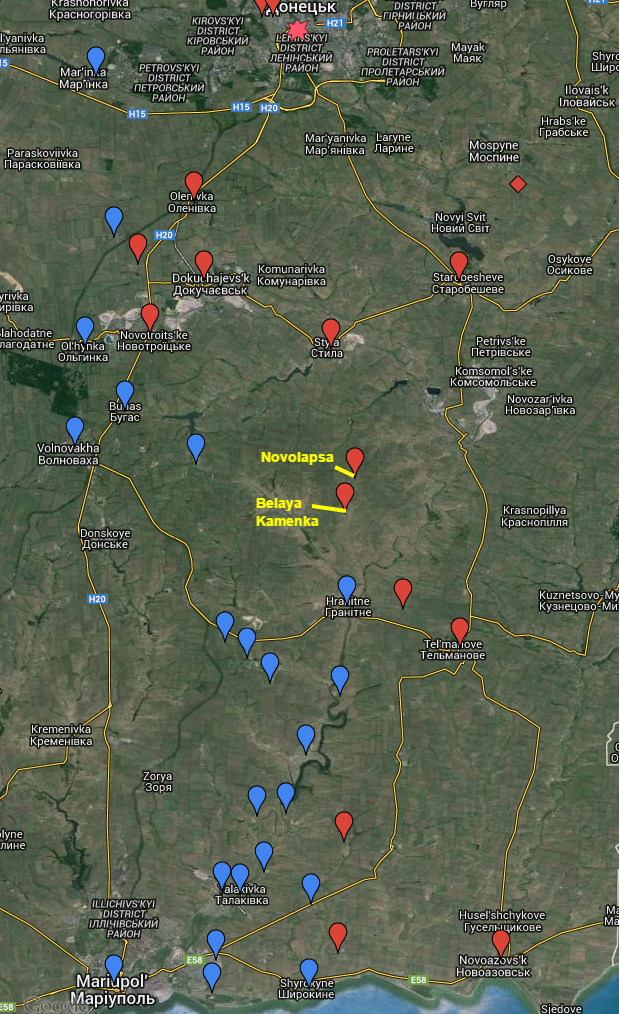
— Pierre Vaux
Ukrainska Pravda reports that President Petro Poroshenko, speaking at an open cabinet meeting, has declared that critics of military mobilisation represent the same threat that Ukraine’s military faces on the front line. Poroshenko also announced the arrest of 19 people who had, for the last two weeks, been conducting an “aggressive campaign” against the mobilisation.
The Interpreter translates:
“They were on-board with journalists – so-called journalists – and community leaders – so-called community leaders, who represent the same threat as the enemy at the front, and we will fight them just as forcibly,” he said.
According to Poroshenko, the SBU [Ukrainian Security Service] has already uncovered the “den, where the anti-Ukrainian activity was generated, and has thus far picked up 19 aggressive critics of the mobilisation from one site.”
He added that the SBU, on his instructions, would continue to uncover such critics.
He was certain that “this anti-government activity has no relation whatsoever with democracy or freedom of speech.”
Poroshenko attested that the people support such measures.
He also spoke about certain local leaders sabotaging the mobilisation process.
“People want to defend their motherland, but certain chairmen on village councils refuse to implement act upon their notices or to hand out individual military service summons,” he said indignantly.
According to Poroshenko, such leaders will be dealt with by law enforcement bodies.
He also stated that, after the cabinet meeting on Wednesday, some governors, in regions where the process of mobilisation is going too slowly, will be dismissed.
— Pierre Vaux
The commander of the U.S. Army’s European forces, Lieutenant General Ben Hodges, has said that it is clear that Russia’s military is directly intervening in the battle for Debaltsevo, northeast of Donetsk. Business Insider reports:
“It’s very obvious from the amount of ammunition, type of equipment, there’s direct Russian military intervention in the Debaltseve area,” Hodges said as he toured a NATO base in Szczecin, Poland…
“I do worry that if they’re successful in Debaltseve they will shift their attention to Mariupol. I don’t know that but I’m concerned,” Hodges said.
The Interpreter has been documenting the direct Russian military intervention in Ukraine since March 2014. Those efforts have increased in recent months. But the unanswered question is to what extent the Russian military is taking direct control of the fighting on the front lines in places like Debaltsevo. Hodges is making a clear distinction here — he’s saying that not only are Russian troops in Ukraine, but they’re directly intervening in the fight for Debaltsevo.
Our own work matches Hodges’ assessment:
According to Daily Mail, Hodges also said Russia could send more troops into Ukraine if needed:
Hodges also said that Russia had 10 battalions of soldiers near the eastern Ukrainian border
— James Miller
Russia has confirmed that a Russian fighter jet, an Su-2, has crashed in the Volgograd region, the region directly east of Ukraine. The Russian state-operated TASS agency reports:
The Su-24 jet crashed seven kilometers from the runway. The fate of its crewmembers is unknown so far. A law enforcement source told TASS that the pilots have presumably ejected.
“On the order of the Chief of the General Staff of the Russian Armed Forces flights of the Su-24 planes are suspended until the causes of the accident are investigated,” the press service said.
The Chinese news agency Xinhuanet adds that the plane crashed at 11.23 AM Moscow time (0823 GMT) near the city of Kalach-on-Don, which is west of Volgograd, after it took off from the Marinovka airbase, (here on the map) about 280 kilometers from the border with Ukraine (perhaps only a thirteen to fifteen minute flight for an Su-24).
However, 24 Today adds an interesting wrinkle to the story:
Earlier, the Azov regiment stated on its Facebook page that its fighters downed a Russian Su-25. It was reported that the attack aircraft crashed near Kuibyshev.
The Azov battalion is a volunteer battalion, not likely to be given advanced anti-aircraft weapons. The most we’ve ever seen them use is a Zu-23-2 anti-aircraft machinegun which is really more effective for hitting helicopters and soft ground targets than an Su-24 or Su-25. Also, Kuibyshev is approximately 550 kilometers from the Marinovka airbase and approximately 250 kilometers from the Russian border. Without additional reports of an Su-25 penetrating that deep into Ukrainian airspace, it’s likely that this report is just a rumor, but we’ll continue to monitor the claim.
— James Miller
Johnson’s Russia List, or JRL, run by David Johnson, is a widely-read and influential email newsletter and website, also referred to as a listserv, which publishes a regular compilation of English-language news on Russia from a variety of sources.
On February 10, an interesting article with a rather shocking headline was included on that day’s list:
Fort Russ: “Germany reserves the right to impose sanctions on Ukraine”–Steinmeier. Ukrainian MFA summons Germany’s ambassador after Steinmeier mentions possible sanctions against Kiev.
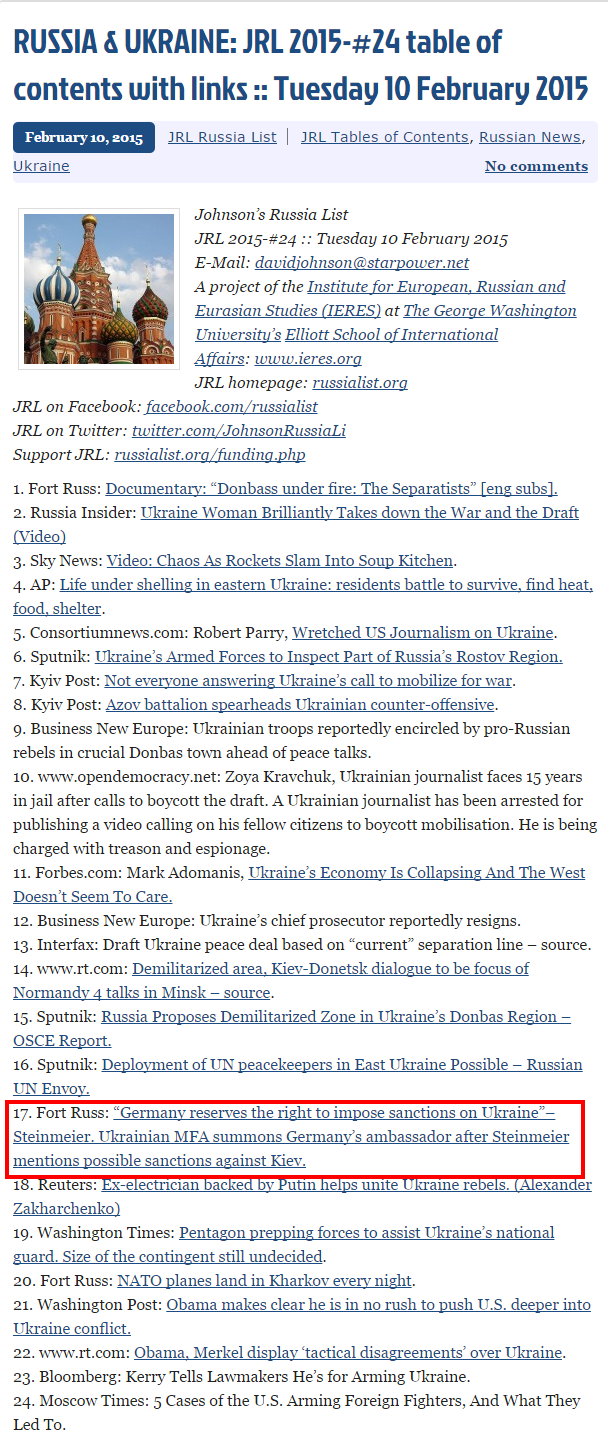
The article, on the FortRuss blog, was dated February 9, 2015, and is an English-language translation and commentary on an article from the Ruposters.ru news portal, published that same date.
The article claims that the German foreign minister, Frank-Walter Steinmeier, has announced, in an interview with ARD TV, that sanctions against Ukraine are a possibility, and that the Ukrainian Foreign Ministry is furious.
An excerpt from FortRuss:
Steinmeier said that if no political decision is reached in Ukraine, the German government reserves the right to “act decisively against the Ukrainian leadership, up to and including sanctions”.
Germany’s ambassador to Ukraine Christoph Weil was forced to have a discussion with the Deputy Foreign Minister of Ukraine Andrey Olefirov due to Steinmeier’s statement.
At this point, it becomes clear that there is something wrong with the report, which is a faithful translation of the Ruposters original.
Andrii Olefirov is, as these recent Ukrainian government statements indicate, the Ukrainian ambassador to Finland, not the deputy foreign minister.
He was, however the deputy foreign minister earlier, before he was assigned his ambassadorial post in October last year.
Two reports, one from RIA Novosti’s German-language service (now rebranded as Sputnik) and another, in Russian, from TASS, appear to show the true story.
Both these reports bear a close resemblance to the paragraphs quoted above, but they date from February 4, 2014, when Olefirov was indeed the deputy foreign minister, in the government of Viktor Yanukovych.
What Steinmeier is referring to here then, is the possibility of sanctions against the Yanukovych regime, which was, at that time, brutally cracking down on the EuroMaidan protests.
In order to help re-contextualize a report on Germany criticising the oppressions of the Russian-backed ancien régime as a critique of the Poroshenko government, the Ruposters piece makes some additions.
From the FortRuss translation:
Ukrainian diplomats are very sensitive to Western countries’ position on the ongoing crisis in the country. However, that sensitivity is very one-sided. In December Ukraine’s ambassador to the EU Andrey Eliseev similarly strongly reacted to Steinmeier’s statement that Ukraine is not wanted in NATO.
“Nobody can prevent Kiev from joining NATO!” was the Ukrainian diplomat’s reply. Germans, as usual, took no offense, and nobody summoned Ukraine’s ambassador to the German MFA.
The NATO issue does not appear anywhere in the earlier RIA or TASS reports.
Furthermore, the “Nobody can prevent Kiev from joining NATO” line, in it’s original Russian, appears only on Ruposters and several other little-known pro-Kremlin news sites and forums.
Indeed a quick search reveals that, while the Ukrainian ambassador to the EU does have a surname which may have been translated as “Eliseev,” his name is not Andey, it is Kostiantyn Yelisieiev.
Nor can we find, so far at least, the source of this supposed ambassador’s remarks, which Ruposters claims to be in Die Welt.
This piece appears therefore to be a carefully constructed assembly of part-truths and inventions designed to mislead readers. The entire article falls apart under the most basic scrutiny and, given its dramatic and surprising claim, really ought to have been looked at carefully.
Other stories included on JRL lists are most likely fabrications, such as this report on NATO aircraft landing in Kharkiv, again taken from FortRuss. However these stories often depend purely on readers taking conspiracy-theorist blogs at face value, whereas the FortRuss report we have analysed here manipulatively credits real news organisations and includes snippets of genuine reportage.
In October last year, Rosie Gray wrote for Buzzfeed that Johnson’s Russia List did indeed appear to be taking on the Kremlin line:
Since the start of the current geopolitical crisis between Russia and Ukraine, the list has increasingly included content from Russian state media and other sources sympathetic to the Russian version of events. Johnson’s personal Twitter feed, which has been deleted or removed since BuzzFeed News started reporting on this story last week, has been particularly combative. In one cached post, he called the journalist Anne Applebaum a “silly obsessed woman” for warning that the West may have to prepare for military conflict with Russia. He often criticized journalists for seeming to side with Ukraine: “Russia bad, Kyiv good. Is this the story you report?” he tweeted at two journalists covering the story this month. In another tweet, he accused well-regarded Guardian correspondent Shaun Walker of making “uncertified claims” about Russian designs on the eastern Ukrainian town of Mariupol.
With that in mind, this is more evidence that JRL is either woefully incompetent in reading and selecting articles — choosing a shock-headline, poorly sourced article from an obscure blog to include in their news letters — or that they are intentionally distributing pro-Kremlin disinformation.
— Pierre Vaux
Vyacheslav Abroskin, the head of the Donetsk regional branch of the Interior Ministry (MVD), has written on his Facebook page that Colonel Yevheniy Yukhanov, the chief of police in Debaltsevo, was killed yesterday when Russian-backed fighters attempted to storm a police station in the besieged, Ukrainian-held town.
The Interpreter translates:
Yesterday, in Debaltsevo, a sabotage and reconnaissance team of militants attempted to seize the town police department.
Police officers, together with fighters from the Artyomovsk MVD special operations battalion, fought off their attackers, who had not expected such aggressive resistance.
The head of the town police department, Colonel Yevheniy Georgievich Yukhanov, died heroically.
The Ukrainian police have lost one of their best members.
May his memory be cherished and he rest in peace.
Heroes don’t die.
The location of the police station, near the centre of the town, indicates that small groups of Russian or separatist fighters can now pass through the Ukrainian front lines to carry out attacks.
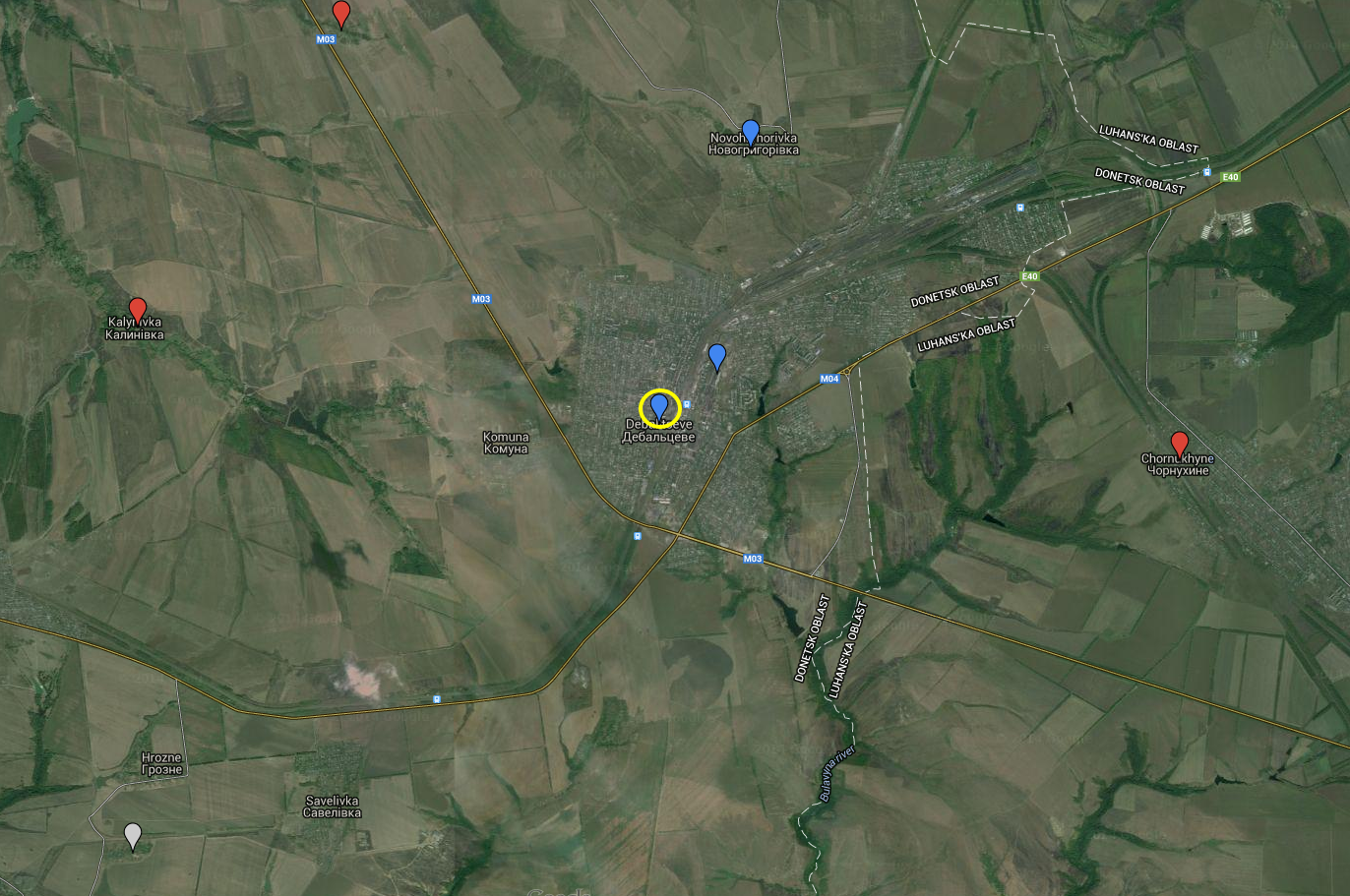
— Pierre Vaux
Reuters reports that the French foreign minister, Laurent Fabius, has told France Inter radio that:
“There are a number of problems which remain to be resolved … but it is very likely to go ahead. It is really a last-chance negotiation.”
A Russian diplomatic source presented the agency with more optimism, saying it was “70 percent” likely that an agreement would be reached.
“The presidents aren’t travelling (to Minsk) for no reason,” the source said.
Russia’s state-owned TASS news agency reports that President Vladimir Putin is indeed heading to Minsk today.
The office of the president of Ukraine has published a statement today, announcing that 16 people have now died following yesterday’s rocket attack on the Ukrainian-held town of Kramatorsk:
According to recent reports, the artillery shelling of Kramatorsk, particularly the residential areas and the headquarters of the ATO, has led to 64 victims (29 militaries and 35 civilians). 16 people died, 10 are severely wounded. According to the Security Service of Ukraine, the number of damaged houses equals 41.
President Poroshenko discussed the weaponry used in the attack, Smerch MLRS, including cluster-bomb warheads, as we reported yesterday, and the impact this attack would have on today’s negotiations in Minsk:
“These are the evidence of the usage of dispensing weaponry against civilians in the center of Kramatorsk. Here in my hands I have an element of cluster munition “Smerch”. Its radius of effect can reach 90 km. It is savages who use cluster ammunition against civilians. I will show this evidence in Minsk and at the session of the EU Council,” the President said.
The Head of State has noted that it was obvious that Ukraine was under the attack of the most powerful weapons. “Information on this munition proves that it was produced by Russia and used by Russia,” he said.
“It is a crime against humanity when civilians are murdered by Russian weapons in their homes, streets, where there are no militaries, 50 km from the frontline. It is totally inadmissible,” Petro Poroshenko emphasized.
In the course of the visit to the hospital where the victims are treated, the President had a conversation with the wounded and instructed the RSA Head of Donetsk to provide assistance to everyone affected by the shelling, first of all to the wounded. “Ensure everything necessary for the people, first of all medicines and medical treatment,” he said to Oleksandr Kikhtenko.
“A little boy is here in the hospital. He is only 3 years old. Doctors saved his hand, which was almost torn off. His mother died covering him with her body. The boy doesn’t know that yet,” the President informed.
After examining several houses destroyed by the artillery, the President had an operative meeting on the situation in the ATO area and the events in Kramatorsk.
“We demand unconditional peace. We demand ceasefire, withdrawal of foreign troops and border closure. They have nothing to do here. We have no conflict. We will find a compromise inside the country. We must defend peace in Kramatorsk, defend Ukraine. That’s why I am going to Minsk to achieve immediate ceasefire and begin political dialogue. We will sort things out ourselves,” the Head of State noted.
Earlier today, there were reports on social media, picked up by Ukrainian television, that there had been another attack this morning on Kramatorsk.
However Andriy Lysenko, spokesman for the Ukrainian National Security and Defence Council, has told reporters at a briefing that these claims are unfounded, insisting there had been no shelling of Kramatorsk today.
The Donetsk Regional State Administration announced that the reports of shelling were caused by the sound of Ukrainian forces opening fire on an unmanned aerial vehicle which flew over the area, ostensibly collecting information for Russian-backed fighters.
The Administration claimed that the drone was shot down.
Photos have been passed around on Twitter which some are suggesting may show the destruction of a drone over Kramatorsk:
At least one civilian has been killed after a shell struck a bus station in central Donetsk this morning.
According to the city administration, led by the separatist-backed Igor Martynov, the attack occurred at 7:20 (4:20 GMT) this morning, rush hour.
Two buses, the number 26 and the number 24 were in the Central bus station at the time.
Video from the scene was published by the city administration:
Reuters reported at 7:27 GMT:
At least one person was killed on Wednesday when a shell hit a bus station in the center of rebel-controlled Donetsk city, east Ukraine, a Reuters witness said.
The body of a man could be seen behind the wheel of a minibus after a shell fell through the roof of the station, burning up the vehicle and another beside it, he said.
Emergency services at the scene said another person had died in hospital following the attack, while two people were seriously wounded. There was no immediate comment from rebel authorities or the Kiev-controlled regional administration.
At 11:00 GMT, the city administration made another statement, announcing that, taking into account other strikes across the city, there had been a total of 5 people killed and 8 wounded so far today.

Interfax-Ukraine reports that Vladislav Seleznyov, the spokesman for the General Staff of the Armed Forces of Ukraine, has told reporters at a briefing this morning that 19 Ukrainian soldiers have been killed defending the Hostra Mohyla kurgan south of Debaltsevo, the highest point in the area.
“In the area of the Hostra Mohyla barrow as a result of artillery attacks and fighting Ukraine has lost 19 soldiers, including 17 servicemen of the Armed Forces of Ukraine and two officers of the Interior Ministry,” he said at a briefing on Wednesday morning.
Selezniov added that 78 soldiers received injuries of varying severity. They have been hospitalized.
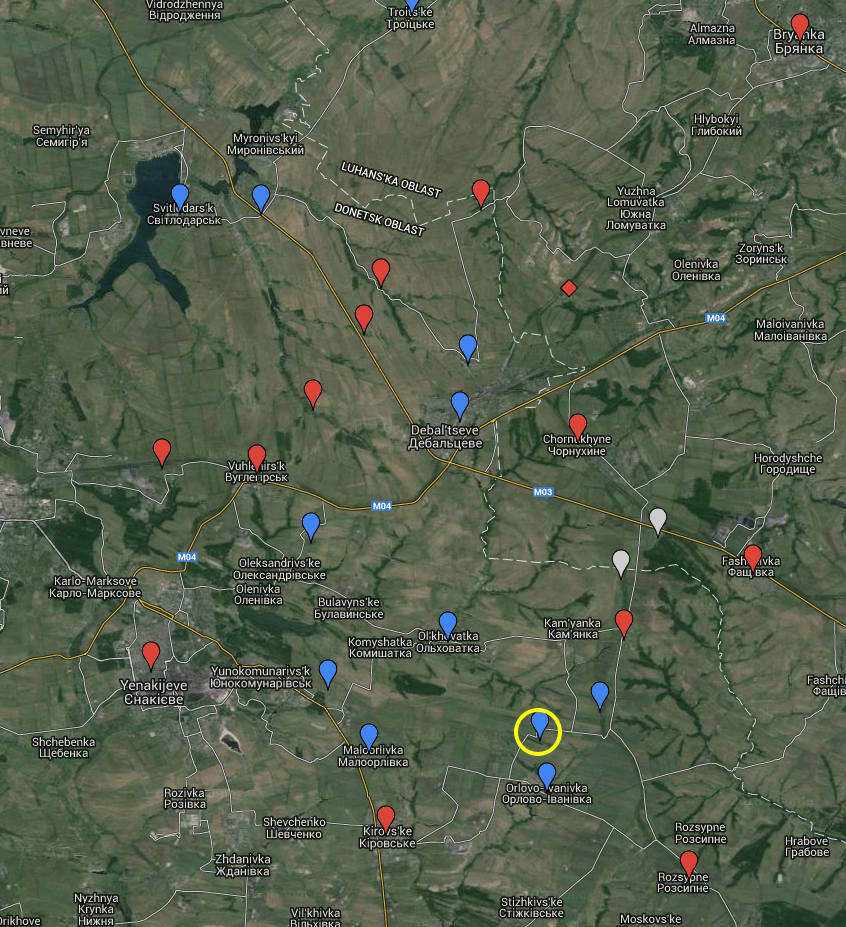
This Ukraine Today report from November 27 last year gives some idea of the tactical situation at Hostra-Mohyla:
Hostra Mohyla is the most dangerous and remote post of occupied by Ukraine’s army in eastern Ukraine. It is extremely hard to get to because the road to mountain is controlled by pro-Russian militants.
Ukrainian intelligence agents have set up a post there in order to gather clues about possible attacks.
Ukrainian soldier: “There are two slagheaps and a railroad lying between them. They continually shell our positions from mortars.”
As far back as September 14, when these Google Earth satellite photos were taken, there was clear evidence that the kurgan was the target of heavy shelling:
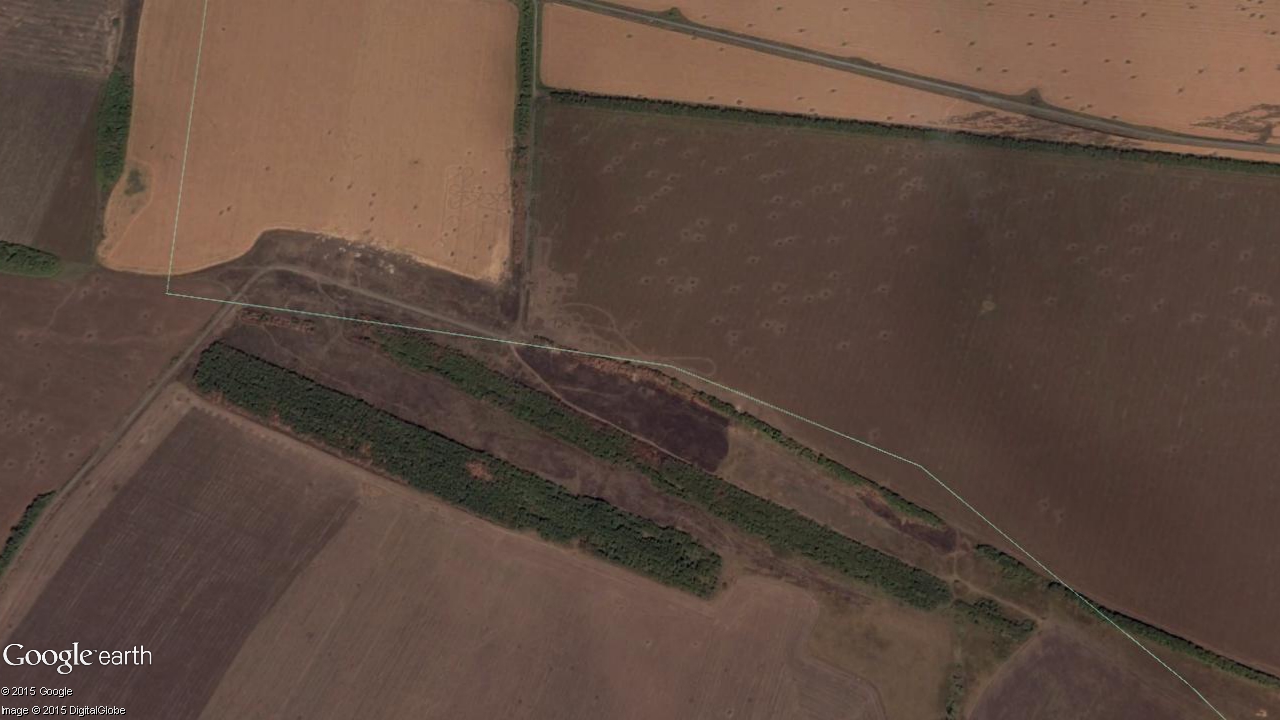
— Pierre Vaux